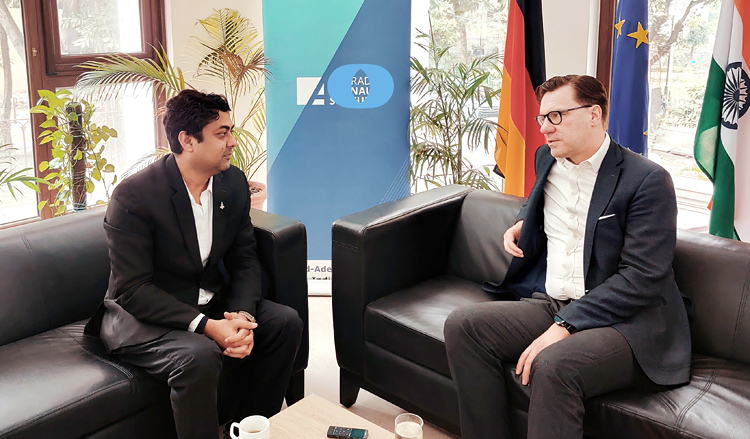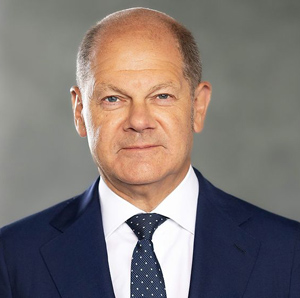INDIAN ARMED FORCES CHIEFS ON OUR RELENTLESS AND FOCUSED PUBLISHING EFFORTS

The insightful articles, inspiring narrations and analytical perspectives presented by the Editorial Team, establish an alluring connect with the reader. My compliments and best wishes to SP Guide Publications.

"Over the past 60 years, the growth of SP Guide Publications has mirrored the rising stature of Indian Navy. Its well-researched and informative magazines on Defence and Aerospace sector have served to shape an educated opinion of our military personnel, policy makers and the public alike. I wish SP's Publication team continued success, fair winds and following seas in all future endeavour!"

Since, its inception in 1964, SP Guide Publications has consistently demonstrated commitment to high-quality journalism in the aerospace and defence sectors, earning a well-deserved reputation as Asia's largest media house in this domain. I wish SP Guide Publications continued success in its pursuit of excellence.
- Indian Air Force Aims for Full Indigenous Inventory by 2047 — Air Chief Marshal A.P. Singh
- General Upendra Dwivedi takes over as the Chief of the Army Staff
- Rajnath Singh assumes charge as Defence Minister for the second consecutive term
- Admiral Dinesh K. Tripathi assumes Command of the Indian Navy as 26th Chief of the Naval Staff
- Prime Minister witnesses 'Bharat Shakti' – a Tri-Services Firing and Manoeuvre Exercise in Pokhran, Rajasthan
Indo-German Security Dialogue
Germany to have a dialogue with India on security cooperation is a high priority as per Nico Lange, Security Expert at the Munich Security Conference

Nico Lange is a Non-resident Senior Fellow with the Transatlantic Defense and Security Program at the Center for European Policy Analysis (CEPA). He is also a Senior Fellow at the Munich Security Conference in Berlin and Munich. Amidst geopolitical conflicts globally, he speaks with Manish Kumar Jha on the greater security cooperation with India.
Manish Jha (Jha): The Munich Security Conference (MSC) – what is the takeaway in the context of German-India relations? We still note from here as observers that Germany is still trying to understand the policies towards India. Is there ambiguity and if you throw light on this how do you look at that?
Nico Lange (Lange): To be very honest with you, this year India did not play a very prominent role at the MSC. Other issues are more important at the moment. And of course, the main mode of the conference was very much circling the question: How can the Europeans provide for their security if there are different approaches in the United States? Without really having an answer in Munich. Then there was the Ukraine-Russia issue very dominant with Alexej Navalny being killed just when the conference started and Julia Navalnaya being on stage with President Zelensky there.
"The interest to have a dialogue with India is maybe bigger than ever before. We want to have conversations about security cooperation. We want to have conversations about the security industry and technological cooperation."
So naturally that was the main focus of discussion. And there was a third element. We had – I think the largest number ever – of representatives from Asia, from Latin America, from Africa. And we all noticed they tendto tell us very unpleasant things and formulate unpleasant positions on stage and in discussions. And it is especially true in the context of Israel and Gaza. But also, regarding other issues. It's difficult to sum up this MSC in a very short frame but if I should frame it in one sentence I would say: The Chinese Minister of Foreign Affairs who was there, he was probably flying home and thinking to themselves: There is no danger from them there in Munich.

Jha: So, the Russia-Ukraine war primarily was the focus area and also the problem in Palestine in the geopolitical situation today. Do you think Germany as a country is leading rather confined with your allies and partners? How do look at India in terms of the geopolitical strategic alignment from your perspective?
Lange: Well after three days of the Munich Security Conference, the first thing I did was fly to India. And I am not the only one. We have a large group come. Not only Germans but other Europeans as well and also from NATO itself. I think also from the defence industry. And I think the interest to have a dialogue with India is maybe bigger than ever before. We want to have conversations about security cooperation. We want to have conversations about the security industry and technological cooperation. There is a very high dynamic in this area and the positioning when it comes to the most important wars from our point of view – Russia and the Russian invasion of Ukraine and Israel-Gaza – is something I think, Germany started to talk about with India and with other countries very intensively over the last months.
Jha: The war is affecting you. The people are dying in Ukraine. Is there some sort of resolution with Russia or is the discussion just taking place in a vacuum?
Lange: At the Munich Security Conference, it was very clear: We will not allow Russia to win the war. You can criticise Germany, France, Italy, and Spain for not doing enough and I would also criticise it but in the end, there is a strong unity and maybe by the death of Alexej Navalny, it's even improved. But that of course means this continues to be a long war. The industrial and technological base for the war is more important in the long war now. And now it's about partners around the world for supply chains, for the industrial base, for technologies. And of course, we will continue to discuss this also with India.
"We will not allow Russia to win the war. But that of course means this continues to be a long war. The industrial and technological base for the war is more important in the long war now."
Jha: How can India play a role or should play a role in this? In what way can India do so?
Lange: My impression is, the structures of the defence industry and technology, develop a very high dynamic now. And many countries are investing more and more in defence. Not as fast as many people want it but there is a lot of movement in that. And I think it's a decision also for India if it wants to plug into that and be part of that development. To get over the partners. And I mean it's not even NATO countries. It's a global phenomenon and I think the global reaction to Russia's war against Ukraine and the global posture against Russia will define many developments for the upcoming years from our point of view. India was perceived at least to be almost on the side of Russia in this in the beginning and now things seem to be changing. And we want to have more conversations on that.
Jha: You are shifting the entire geopolitical discussion on this particular aspect while ignoring the hegemonic country, China. And if you see the example in the South China Sea, it is breaking international laws and supporting proxies. When do you intend to question that?
Lange: Well, I have to differ here between me personally and the German government. Because I would prefer the German government to have a stronger stance when it comes to China's actions in the South China Sea and China's very clear and visible ambitions. But I would consider that the global reaction to Russia's war against Ukraine – including unprecedented sanctions, sanctions that will be reinforced and building the technological and industrial base for a modern type of warfare – while it is done to defend against Russia, I think it's also sending a signal towards China. My impression is, that the Chinese are looking at this very carefully and they are maybe reconsidering some ideas they have.
"The global reaction to Russia's war against Ukraine – including unprecedented sanctions, I think it's also sending a signal towards China."
Jha: Within the European Union, Germany is the largest trading partner of India. Having said, you are also keen to have a security and defence partnership building this military-industrial complex, but it seems like it's very difficult to take off at the moment. Shall we wait for the future to unfold the partnership?
Lange: We are late to that. I think we have to admit that. We overlooked this for a while. And we were maybe too inward-looking, especially Germany. And now we have to try to build or rebuild this kind of partnership. I think high-level visits of the German government together with industrial partners, happened for the first time during the last two years.
So, I think we are at the beginning of a new level of partnership when it comes to technology and defence industry. The situation I think when it comes to the German defence sector is a situation where unfortunately we are talking about a turn of the time – a Zeitenwende – and a fundamental change. But, from the Russian aggression against Ukraine to building a new ammunition factory in Germany it took Germany almost two years. So, unfortunately, we are very slow in this.
Jha: To be more specific how is the German industry coping with the challenge of high production, and supply-demand for this war? How is the situation now as far as the industry is concerned within the German military-industrial complex?
Lange: Well, I think we have problems that other countries also have. We are not used to steadying high industrial output when it comes to defence, especially ammunition, but I think that's also true for many platforms and many technologies. We have slow procurement processes and we are overly bureaucratic, but I think that's something many countries have in common. But now that everybody is investing and now that we have a long large-scale war ongoing, I think we will see scarcity when it comes to some resources and competition for these resources, components for drones, and certain fundamental resources that are needed that are to build ammunition or high-tech systems. And I think there is a base there to also have a discussion and a dialogue between Germany or the European partners in a more general term and India in that respect.
Manish Kumar Jha is a Consulting & Contributing Editor for SP's Aviation, SP's Land Forces and SP's Naval Forces and a security expert. He writes on national security, military technology, strategic affairs & policies.





